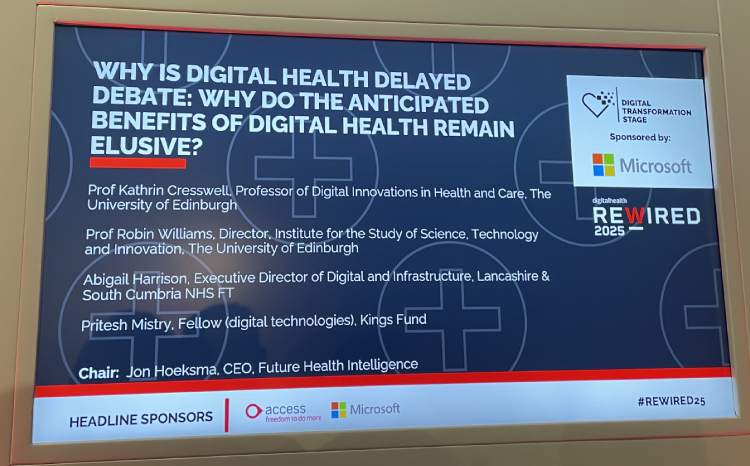Berkshire Healthcare NHS FT driving forward with digital-first policy
- 26 July 2022

Since being selected as a Global Digital Exemplar (GDE) in 2017, Berkshire Healthcare NHS Foundation Trust (BHFT) have driven forward with a digital-first policy, positioning themselves as a digital pioneer in the process. Dr Guy Northover, CCIO, consultant child and adolescent psychiatrist and lead clinical director at the trust spoke exclusively to Digital Health News about their digital focus, clinician and patient feedback, future ambitions and advice for other trusts looking to evolve digitally.
Five years ago, BHFT became one of only seven mental health trusts in England to gain GDE status, receiving £5million in funding from NHS England to further transform patient care and engagement through new technology.
Since then, the trust has prioritised digital and utilising technology to enhance healthcare delivery with a focus on productivity and safety.
According to Northover, it was an easy decision for the community and mental health trust to adopt a digital-first policy and position itself as a digital pioneer.
“Why wouldn’t you use digital. We have to accept that it is a part of our everyday lives, and it is there to and does drive everything that we do,” he said.
“If we exclude it, then we’re going to be left behind and we’re never going to be able to drive the effectiveness and efficiencies that we need to in the future.”
Being a GDE has been really important for the trust to help overcome hurdles that arise when trying to do something for the first time.
Northover added: “Being a global digital exemplar was significant as it allowed us to have that focus on the hurdles and really get to a position where we want to be.
“We’re not absolutely there yet, there’s still a long way to go. Ultimately with digital, it needs to be integrated into every part of the pathway so that a service user or patient wouldn’t need to know where the digital is being used, they’d always have their information at their fingertips.”
A success with clinicians and patients at a critical time
The digital transformation that Berkshire underwent has significantly improved patient experience and proved to be key throughout the peak of the Covid-19 pandemic.
With hospitals across the country under more pressure than ever before, the trust’s ability to adapt due to the systems already in place meant that the quality of care for patients did not decrease, even if they were at home.
“In terms of feedback and where I think the real advantages of everything we’d done showed up was when the Covid pandemic hit because we were able to switch to home working in an instant and had no problems or concerns,” Northover told Digital Health News.
“We could quite easily say to all the clinicians ‘pick up your laptop and go home and use the video consultation systems’ as we had already got them up and running.
“The fact that Covid didn’t have an impact on the delivery of care as much as it might have done in other organisations and staff didn’t have the challenges of trying to connect and constantly dropping off the system shows how well-placed we were.”
The technological capabilities that the trust offered during the pandemic went down just as well with patients as it did with clinicians. Northover said “the feedback the trust got from patients was that this was helping them because they can access care and support at times that suit them”.
Evidently, the ability for patients to not spend half a day or a whole day going to an appointment and instead receiving the same quality care at home was a big hit during the pandemic, as was the ability for clinicians to deliver care to the same standard, all thanks to the trust’s technology.
The next steps of Berkshire’s digital journey
BHFT have already been through significant digital transformation in recent years since becoming a GDE. For example, last year they partnered with Servelec and went live with a digital bed management solution, replacing several paper-based systems in the process.
The trust is also transforming care through digital appointment correspondence (DAC). Many of their services can now send digital appointment letters directly to patients through their smartphones and devices thanks to the solutions provided by Healthcare Communications, meaning they can securely find all the information they need to know about their appointment, instantly.
Berkshire have also recently released a new digital strategy, something that Northover was keen to emphasise to Digital Health News.
He said: “We’ve recently released our digital strategy and the main thing we’re looking to focus on is productivity, such as how we make sure that we’re avoiding duplication of work.
“This links very much to our pathology systems, so thinking about how we can use robot processes and automation, where it’s needed and how we can make sure we’ve got everything linked into our electronic record, so everything is as smooth and easy as possible for the clinicians.”
Northover also stressed the importance of ensuring that staff at the trust are able to use all the new systems and technology by having appropriate and effective training in place.
Advice for those following suit
Northover’s main piece of advice for those undergoing a digital program is “clinical leadership” and everyone being on the same page.
“It’s absolutely the clinical leadership. If your solutions and your ideas are not driven by the frontline clinicians, then you’re going to start developing a disconnect between various teams with ideas and the clinicians with theirs, and you’ll start getting frustration,” he said.
Northover also believes that “there aren’t really any limits to digital, so you shouldn’t be limiting yourself in what you want to achieve through the digital that you want to implement”.




